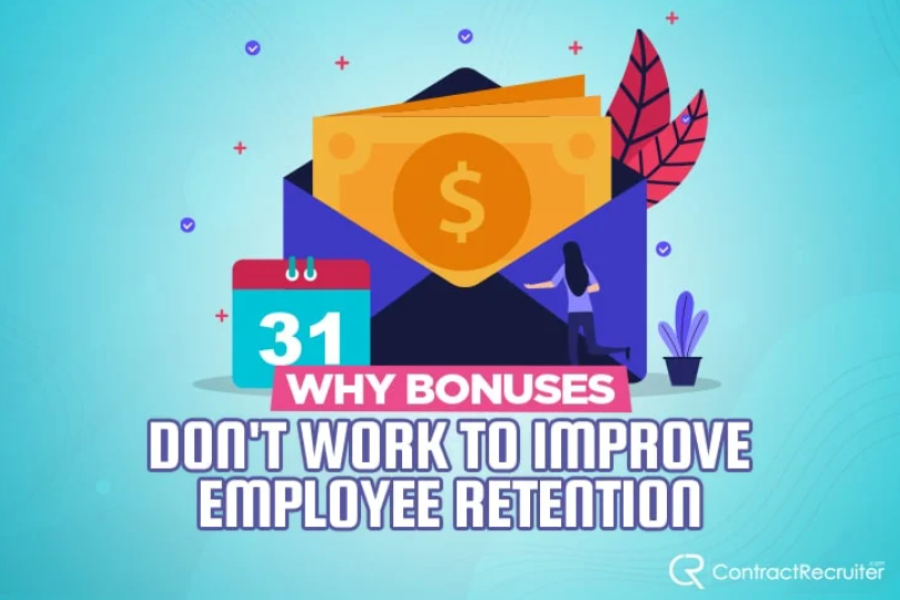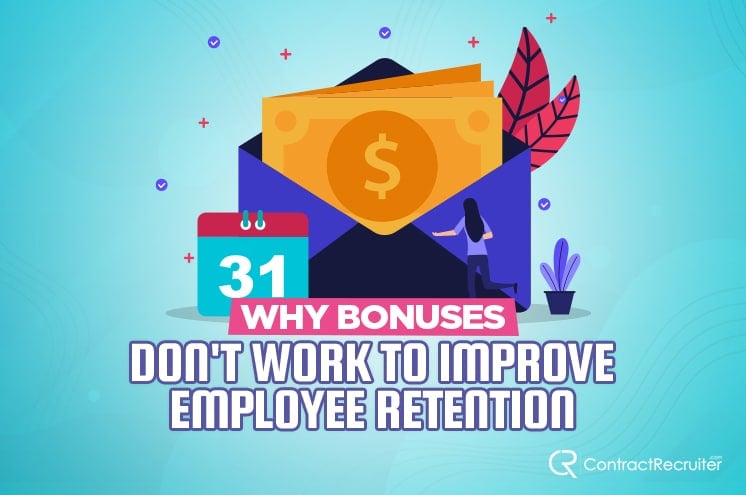There are many different ways a company can encourage employee retention; one of the most popular is the retention bonus.
At first glance, it seems like a good idea. Employees who stick around get a bonus to financially reward their loyalty. What’s wrong with that?
The truth is, almost everything. Retention bonuses have tons of issues; foremost among those issues is a simple fact: there’s no evidence that they work.
What is a Retention Bonus, Specifically?
A retention bonus is a monetary bonus given to employees outside of their usual salary.
Most often, they are used when there’s a crisis or shift in the company, such as a PR disaster or a merger, but they can also be used during a crucial business cycle to try to ensure that key employees stay on board.
“A retention bonus is a targeted payment or reward outside of an employee’s regular salary that is offered as an incentive to keep a key employee on the job during a particularly crucial business cycle, such as a merger or acquisition, or during a crucial production period. This payment, meant to keep an employee from leaving their position, is typically a one-time payment.” – Investopedia.
Bonuses are also frequently used to combat corporate poaching. Since poaching employees is explicitly not illegal, companies need to do something to keep their employees around, and bonuses are a common answer to that problem.
The Many Reasons Bonuses Don’t Work for Retention
The biggest problem with a retention bonus is that there’s no evidence that they’re effective. Bonuses have a lot of issues, and as it turns out, they are rarely more attractive than whatever outside reason the employee has to leave.
Bonuses are one-time payments and don’t foster long-term loyalty.
The biggest issue with a bonus is that it’s just that: a bonus. Bonuses are one-time payments, unlike a raise, which is a long-term benefit to the employee. As such, the employee knows that the money is just a one-time thing. They might recognize how minimal it is, compared to what actual compensation would be worth, especially if they’re already considering outside offers.
Consider the plight of nurses right now. Many hospital systems are offering anywhere from $5,000 to $40,000 as a sign-on bonus. Meanwhile, nurses who haven’t jumped ship are getting a pittance in comparison. On top of that, the new starting salary for nurses is increasing such that a fresh-out-of-school nurse can be making more than a ten-year veteran of the hospital. Even a more significant retention bonus won’t solve that problem.
The effect a bonus has on retention “wears off” over time.
Another major problem with a bonus is associated with its temporary nature. Many employees look at a bonus and think, “alright, that’s enough to keep me around for a month.” After that month is up, the employee no longer feels guilty about looking for a new job and is still just as willing to jump ship; all the bonus did was keep them around for a few weeks.
Now, if the reason you’re offering the bonus is due to crunch time, and in a month, you won’t need their services as crucially, this is fine. However, that’s not the case in most situations. Often, bonuses are used to potentially increase retention through tricky and permanent situations like mergers and acquisitions. Unless you’re willing to pay a retention bonus every few months, you’re not going to get long-term effects from the bonus, and at that point, it’s just a raise by another name and with less consistency.
Money is an ineffective motivator for retention when the reason to leave isn’t monetary.
When an employee chooses to leave your company, why did they make that decision? Sometimes, sure, it’s because you’re not paying them enough, or their benefits aren’t good enough, or they’re spending too much money on a commute. In those cases, a bonus might be able to get them to stick around while you work out a better offer, increased benefits, or higher pay.
Most of the time, though, the reason an employee leaves has nothing to do with the money. Maybe they don’t like their manager. Maybe the company merging with yours has a bad reputation, and they want nothing to do with it. Maybe they don’t like the direction your company is going. Maybe they don’t feel valued or that their contributions are meaningful. In these cases, a bonus won’t help and can even hurt if it’s insultingly low.
Uneven bonuses can convince others to jump ship.
When you give out a retention bonus, who do you pick? Most companies choose their most valuable or crucial employees. It seems fine on paper, but put yourself in the shoes of the employees who don’t get a bonus. They feel less valued or less respected, and they have tangible evidence that you don’t care about them as much as you do about the people who got a bonus.
Even if you pay them more, all they see is themselves getting passed over for a bonus. You might keep your bonus employee around, but the others might leave in response.
Bonuses can also cause resentment or jealousy in loyal employees who don’t get one.
This reason is an extension of the same point we just made, but with a different angle. Those employees who don’t get a bonus feel bad about the situation. Many of them, however, may not be in a position to jump ship immediately. So, they’ll foster that resentment.
They might work more slowly, put less effort into their job, or not pay as much attention. Some rare cases might even subtly sabotage their job out of spite. All because they didn’t get a bonus when someone else did.
A bonus gives an employee a buffer to search for a better job.
Another problem with a bonus is that, unless there are specific stipulations on how long the employee needs to stick around to get the money (such as paying it out over the course of three months), it just becomes a financial buffer the employee can use to search out a new job anyway.
Absolutely nothing stops them from seeking out new work, and even if you have stipulations on the bonus paying out, they can use that lost bonus to negotiate a higher starting rate from a new company.
Savvy employees may seek additional bonuses when they know they’re available.
Once you’ve opened the Pandora’s Box of bonuses, you open yourself up to potential exploitation. Many employees will see that someone got a bonus and will start to fish for one for themselves. If they know that they’re a critical employee, even if they’re loyal enough to stick around, they might start a job search, talk about it with their coworkers, “accidentally” browse Indeed on a company machine, or otherwise let slip that they’re thinking about leaving.
In the best-case scenario, they essentially hold themselves hostage until you pay them a bonus. In the worst, their job search is real enough to find them a better offer, and you lose an employee you weren’t otherwise going to lose.
Bonuses can encourage bad behavior, because they prove you need the employee.
A bonus is a tangible form of proof that you need the employee enough to pay extra to keep them around. Many employees will take that as a sign of job security and may relax their behavior. They may be more free with criticism of the company or their managers, they might slack off or work less, and some may even get full of themselves.
Either way, bad behavior can result from a bonus, not because of the money itself, but because of the implication.
A bonus only encourages staying around, not working harder.
The flip side of a bonus is that a retention bonus is literally “we’re paying you to stay here and keep doing what you’ve been doing.” It confers no additional responsibilities, rights, or value, so the employee has no reason to step up their game. If you give them a retention bonus and then expect them to work harder, take on additional responsibilities, or otherwise do more, you’re going to be out of luck.
This is especially true of situations where you give one employee on a team a retention bonus, but cut two or three others from the team due to a merger or acquisition cutting budgets. Dividing those responsibilities amongst the remaining team requires more incentive than just a minor one-time bonus.
Convinced that bonuses don’t help? Well, good news; there are several things you can do instead of offering a bonus that can boost retention.
What to Do Instead of a Bonus to Encourage Retention
Since a plain old monetary bonus doesn’t do enough to encourage retention – and can even have the opposite effect – you should look for other alternatives. There are plenty of ways you can boost employee retention in different ways.
Give your key employees a raise.
One of the biggest problems with a bonus is that it’s a one-time payment with no increased overall value to the employee. That money isn’t treated like an additional perk of the job; it’s just something they can use to pay down debt or buy something nice. It’s a treat, not a diet.
One of the best ways to boost retention, particularly for your key employees, is to give them a raise. A raise shows that you value them not just right now, but for the long term. More importantly, it’s more value to them over time.
If you think a raise seems expensive, the cost of hiring a new employee to replace the lost critical worker can be even steeper, so it’s worth considering the balance.
Conduct exit interviews and look for the reasons people leave, to address them.
Inevitably, people will leave your company. Turnover is natural; it can even be encouraged in a good company; once an employee reaches the peak of their growth with you, it’s better to help them move on than to try to keep them around in a job with no future.
In cases where turnover is a negative, it’s crucial to conduct exit surveys and interviews as part of an offboarding process. These allow you to ask questions about why the employee is leaving, pointing to problems you may or may not know about. Once you’ve identified a problem, you can then work to solve it.
Some problems don’t have easy solutions. If all of the turnover traces back to a bad manager, getting rid of that manager is beneficial. If people are leaving because of company culture or an impending merger, there’s not likely much you can do about it without extreme changes to the company.
Offer retention tools like stock options that incentivize sticking around.
Stock options are often referred to as “golden handcuffs” because of their sheer value coupled with their ability to keep employees around. They can be a significantly valuable addition to a benefits package as part of a retention plan.
That said, stock options only work if the employee trusts that your company is growing and going places; if they think you’re on the verge of failing, they won’t find value in your stock.
Provide employees training and growth opportunities.
Another way to foster loyalty and keep employees around is to provide them with a route to improve themselves, their skills, and their career. Training, promotions, and growth opportunities are some of the best things you can provide; when you can offer them.
When an employee reaches as high in the organization as it’s possible for them to go, though, you may need to confront the reality that they’ll need to leave sooner or later.
Allow for a healthy work-life balance.
These days, many employees are more concerned than ever before about their work-life balance. They want free time, time off, flexible hours, and general respect for their time and their lives outside of the company. If you can’t provide that, they’re going to find somewhere that can.
Retention doesn’t have to be an unsolvable problem. There are ways to go about it successfully, but bonuses aren’t likely to be your golden ticket.


















